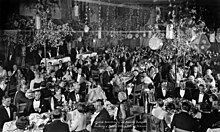1st Academy Awards
| 1st Academy Awards | |
|---|---|

The first Academy Awards was at the Hollywood Roosevelt Hotel.
|
|
| Date | May 16, 1929 |
| Site |
Hollywood Roosevelt Hotel Hollywood, Los Angeles, California, U.S. |
| Hosted by | Douglas Fairbanks |
| Highlights | |
| Best Picture | Wings |
| Most awards | 7th Heaven and Sunrise (3) |
| Most nominations | 7th Heaven (5) |
The 1st Academy Awards ceremony, presented by the Academy of Motion Picture Arts and Sciences (AMPAS), honored the best films of 1927 and 1928 and took place on May 16, 1929, at a private dinner held at the Hollywood Roosevelt Hotel in Los Angeles, California. AMPAS president Douglas Fairbanks hosted the show. Tickets cost $5 (which would be $69 in 2016 considering inflation), 270 people attended the event and the presentation ceremony lasted fifteen minutes. Awards were created by Louis B. Mayer, founder of Louis B. Mayer Pictures Corporation (at present merged into Metro-Goldwyn-Mayer). It is the only Academy Awards ceremony not to be broadcast either on radio or television.
During the ceremony, the AMPAS presented Academy Awards (now commonly referred to as Oscars) in twelve categories. Winners were announced three months before the live event. Some nominations were announced without reference to a specific film, such as for Ralph Hammeras and Nugent Slaughter, who received nominations in the now defunct category of Engineering Effects. Unlike later ceremonies, an actor or director could be awarded for multiple works within a calendar year. Emil Jannings, for example, was given the Best Actor award for his work in both The Way of All Flesh and The Last Command. Moreover, Charlie Chaplin and Warner Brothers each received an Honorary Award.
Major winners at the ceremony included 7th Heaven and Sunrise, which each received three awards, and Wings, receiving two awards. Among its honors, Sunrise won the award for Unique and Artistic Picture and Wings won the award for Outstanding Picture (now known as Best Picture). These two categories at the time were seen as equally the top award of the night intended to honor different and equally important aspects of superior film making. The next year, the Academy dropped the Unique and Artistic Picture award, and decided retroactively that the award won by Wings was the highest honor that could be awarded.
...
Wikipedia
